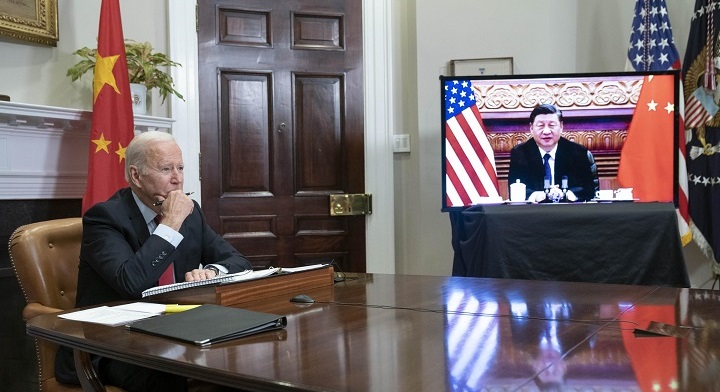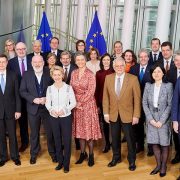
On Monday, US President Joseph Biden and his Chinese counterpart Xi Jinping held their first, long-awaited meeting. It was virtual because of Covid restrictions but perhaps also to minimize the expected chafing between the two leaders.
The summit was about managing the tension, not letting it get out of hand, and fixing some guardrails to avoid a sudden and unintended wrecking of the situation. Then it affirmed that both the US and China de facto agree they are in a cold war. China gave up on the idea of going back to a status quo ante. The US doesn’t want the growing strain to get it out of control.
The summit was no warming of relations; it took place on the backdrop of two intertwined anti-Chinese alliances: the AUKUS (the US, UK, and Australia) and Quad (US, Australia, Japan, and India). Both have “ghost” members, Taiwan and Vietnam. Biden has also called for a summit of democratic countries, also aimed at China, which is not a democracy, and called for massive domestic and international infrastructure spending to counterbalance analogous Chinese plans.
China, conversely, is more concentrated on itself. The recent 6th plenum on history didn’t spend a sentence on the international situation, a sign that the subject is hot and under discussion. But this can’t go on forever.
Mao, the Roman
The present historical situation may be similar to that of the Three Kingdoms in China in the 3rd century AD. Then, the kingdom of Wei, a direct heir of the fallen Han empire, in the north; the kingdom of Wu in the southeast; and the kingdom of Shu in the southwest battled for power and to regain imperial unity. The war was inconclusive as the division of the Han empire lasted for about half a millennium and the central plain, unified by Qin in the 3rd century BC, remained a ferocious battleground for a very long time.
A similar situation also occurred in other places in history. At the time of the Punic wars (2nd to 1st centuries BC), Rome fought not only Carthage but also eastern Mediterranean Hellenic kingdoms, splinters of Alexanders’ conquests. In a long-drawn conflict with many wars, the Romans emerged as total winners, unifying the whole Mediterranean for the first time. Their feat was never repeated.
During the same period, the Romans also managed to expand their territory and secure the northern border by conquering what is now modern France, Britain, and Spain and pushing the Germanic tribes beyond the Danube, while fighting merciless civil wars.
Mao’s success against the Japanese and in the civil war may resemble that of the Romans, not that of the Three Kingdoms. Unlike in the Three Kingdoms, Mao emerged as the total winner, defeating both the Japanese and the KMT.
He did that also by handling and coping with two external powers with competing aims on China: the Soviets and the United States. It ably played one against the other and managed to emerge effectively. The difference was that the Roman empire inherited and took over a mercantile state set by the Greeks and the Phoenicians, and in this way, it was very solid. Mao understood strategy but didn’t understand economics, and after his military and political achievements, his empire floundered economically.
Presently, in theory, to win the competition, China is in a good position; three moves would be sufficient. One, it should open its market and economy; two, open its politics and make it more accessible and reactive to the global economy; and three, teach English to its whole population and make it bilingual. The three moves are delicate and sensitive and may bring about consequences that are hard to predict.
Still, its society and its people, unlike some of the people in the West, are highly active, entrepreneurial, and willing to work and study hard; therefore, they could thrive in a society that is open to the world and could become the hub of the world.
America needs more difficult reforms. It needs to tighten and revamp the old network of alliances that were very strong during the Cold War but were abandoned for three decades. To start a network of roads and railways worldwide could be very expensive and politically delicate; it would need a lot of hard-working and attentive gardening.
Domestically, society is very divided, concentrated on itself and on unresolved past issues, those of race and gender, that have little or no resonance in the developing world. It pays little attention to global strategic issues, unlike during the first cold war. Then necessary reforms in the software and hardware of the country could be hard to come by.
The American moves might come too late and be too little if China were to decide to move first. Will China decide to change its attitude? Looking at the situation as it is now, China is at a crossroads, either moving towards more opening up or moving toward something like a North Korean model. So far, it appears it wants to go for the latter, “North Korea”, because the party and the leadership feel they may lose control of the country and power if they go the other way. But it could be hard to sell a “North Korean” model to Chinese people who are used to forty years of opening up, and the party may want to strive to find yet another way.
Apparently, Beijing now bets that the United States will fail in its effort to reform itself and the politics and infrastructure of the world. If it seems that the United States is succeeding, then it may change tracks.
Russia has the most challenging position because it has to follow and observe the moves of the two more prominent contestants and try to take advantage of any blunder by the two. It could be easy because the two have a history of making many blunders.
In any case, it is for Moscow a slow process where its trench soldiers have to move a step at a time. In the meantime, to sustain this long course, Russia should dramatically reform its economy and boost small and medium enterprises, improve its social and judicial system, and take power from the large state boyars. Yet, state boyars are the pillar of strength in Russia, and like at the time of the Tsar, they are difficult to push aside.
Still, with more details.
The USA
The three contestants of the present time are the United States, China, and Russia. All three have advantages and disadvantages, and they are differently positioned to win in this new complicated cold war. The role of the United States and its tasks are the easiest. America is the incumbent superpower; the world belongs to it. It has the largest armed forces and the most significant industrial complex. It is the center and pumping heart of global finance, and therefore, money and weapons all stem from it. It has won two world wars and one cold war. It comes out of a century of successes, although it hit many snags in the process.
It draws the best minds in the world, attracted by its culture and social environment. English is the international language, and the US has molded the world for over a century, piggybacking on the English imperial and French imperial powers’ centuries of worldwide expansion. However, many things do not work in America. Its hardware and software infrastructure are lagging behind those of other countries. Its ports, airports, bridges, and railways are no longer first-rate. Its universities are the best globally, but many of its primary and secondary schools are Third World level.
While there are children who can speak two or three languages, children from lesser schools struggle to write in their mother tongue or handle basic mathematics. Its healthcare again has some of the best facilities and researchers in the whole world. The three best vaccines that are now effectively defeating the Covid pandemic were devised and produced in the United States. However, primary healthcare is expensive, highly unfair, and poor. The rich get the best healthcare globally; the poor don’t have the money to die with dignity.
This immense social divide is reflected in extreme partisan politics, which has issues finding a middle ground. The best and most innovative companies are all based in the United States, and they are leading the way for the next technological revolution. However, some of these companies, Amazon, Facebook, Google, Microsoft, et cetera, are hijacking political debate and direction. They are heavily conditioning how the country should be shaped and where it should go. If these issues are not addressed, there will be problems.
One issue is that they may indicate a decline of the United States, and therefore it might embolden American enemies who think that its power is waning. This impression is almost as important as the reality of American decline and encouraging the American enemies; it makes a conflict nearer.
China
The second contestant is China. It can be incredibly proud of its success in the past 40 years. It has multiplied by many times its GDP and brought its population from the starving countryside to a middle-income range. Over 90% of the population owns a home, many have a car, and all have a cell phone. Its railway network is the best globally; its highway system is also one of the best, if not the best; its schools and universities are producing millions of new engineers.
However, China also faces problems. It doesn’t accept American hegemony, but it doesn’t have a model to rival it, as the former USSR had. Its primary and secondary schools are good and sometimes excellent; however, the universities do not produce first-rate research, and they are lagging behind those in the United States.
Things may improve in a natural progression, but critics believe that the overall environment of lack of freedom will hamper innovative and groundbreaking research. Despite claims that Chinese technology is reaching American technology, it still lags behind American and Western science by 10 to 15 years. China could catch up, but only if America doesn’t do anything. As America is working, the catch-up phase could fade away.
Moreover, China provides an interesting model for many developed countries, but it is not a place where foreigners are eager to move to or are welcome. Bright scientists, engineers, and artists flock to the United States, where they find open gates. The same is not true for China. These people do not rush to Beijing or Shanghai, and anyway, they are not welcome; they will never become Chinese and be part of Chinese society. China is de facto isolated from the rest of the intellectual world and has to rely only on the development of its domestic intelligence. This can be done, but it could also be hard.
China’s difficulty is not only that Chinese is not an international language, but many Chinese intellectuals and decision-makers are not conversant in English; therefore, they cannot directly talk and listen to important foreigners. They are cut off from the international conversation and isolated. China is not at the moment addressing this issue. China is also cut off from a fluid international capital market and finance. Its currency is not fully convertible, and its domestic debt is enormous yet hard to account for. This makes it possible for China to expand its economic footprint abroad only if the dominant power in finance, the United States, is willing to give credit to China.
When the United States becomes less willing or refuses to give credit to China, China’s expansion abroad has to rely basically on a system of what could be named modern barter. China provides industrial goods and services, and in return, gets raw material, energy, and whatever is needed. This system is extremely cumbersome, hard to manage, and easy to be hijacked one way or another. Moreover, to support American finance, the United States also controls all sea lanes; therefore, it ensures trade worldwide. China doesn’t, and without American guarantees, it is subject to all kinds of interference in theory.
To make up for that, China tried to develop new railway systems that hinge on China’s continental position and therefore bypass American sea lanes. Still, these China-centered roads and railways have failed so far to materialize, and in the meantime, the United States has announced bold plans for alternative road and railway systems. If the United States kicks off its new global network, that the new hyperloop technology could also power, China could be boxed in from the sea and the land.
Russia
The third player in the complex balance of peace and war is Russia. Russia has an abundance of an asset, extremely important in times of war and unimportant in times of peace. Russia is very strategic, and possibly it is the best strategist on the planet now. It has managed to sneak and use every loophole, nook, and opportunity to expand its political footprint and leverage its intelligence and position, vis-à-vis China and the United States.
It objectively stands to gain from a conflict between the two superpowers because whoever wins will have to deal with Russia, which may decide to side with one of the contestants when it decides which side is winning. It may also choose to keep aloof and only collect the spoils of what is left when everything comes to ashes. It managed to regain a foothold in the Caucasus, strengthening the clout with the Armenians against the Azeris backed by Turkey; it has a firmer hold on Syria and the port in Tarsus.
For the first time, it is in Libya, right in front of southern Italy, where it was influential only at the time of the Napoleonic wars over two centuries ago. The flight of the United States from Afghanistan and Chinese timidity in Central Asia has allowed it to regain influence in the area. However, this modern-day Prussia has a very inefficient economy. It gets by selling natural resources and military production, but everything else for daily use is imported. Its economy is shrinking, and military strategy without money is historically doomed to fail.
An exception was the Stalinist USSR, which managed to win the war, yes, thanks to the willpower of its people. But reading more closely into it, Moscow fought also thanks to the industrial equipment and money provided by the United States. Without that, Stalin would have been finished long before his actual demise in 1953. The USSR’s survival during the Cold War was achieved at the cost of depredating all wealth from the people and concentrating on the national build up. The model eventually defaulted and it can’t be replicated. If Russia wants to emerge from the second cold war, it will have to think of more than just strategy.
It is possible, although unlikely, that all three parties will carry out their best strategies. If so, the US would still be ahead, and China and Russia might change their relationship with America. Then, the present cold war could thaw and the overall situation could change. But politics do not move in a linear fashion, there is immense distrust among the different parties, and many things could go wrong on top of the current bad situation.






The US is the hegemon because it spends an inordinate amount on the defense of that hegemony. For that it is not important that it lost nearly all wars it engaged in since 1945.
It also can pay to a considerable extend for its imports with dollars it creates out of thin air. At the same time it has neglected it infrastructure for decades and has exported a large part of its industry to Mexico and Asia. That enables it to get by with a mostly badly educated population.
Its politics are decided by the large economic players. Gore Vidal called it a one-party state – the American Capitalist Party has a Democratic and a Republican wing.
The current situation is not stable and will probably lead to large scale inflation in the short term. How would US succeed in recovering from this mess?
China does not want to be subjected to US hegemony. But it also sees the extreme costs of hegemony to the hegemon as well as to the other countries and therefore prefers to return to the Charter of the United Nations that does not have a special position for a hegemon.
The threat of the hegemon as described in this article is that China’s sea lines of communication might be cut and even its railway lines through Asia. That would damage not only China but very nearly all countries in the world. I think that China with or without the support of other countries would be able to deter US aggression. I do not see how an alternative world infrastructure project would damage China as this country is also not damaged by the project of the Iranian port of Chabahar being built by India.
In the middle of the seventeenth century there were several wars between Danmark and Sweden. In every war the Dutch fleet intervened on the side of the weaker party.
If in a conflict between US and China the latter were the weaker party Russia would certainly intervene on the side of China because it would hate the return of US hegemony. I do not think it would intervene on the side of US if that country was weaker.